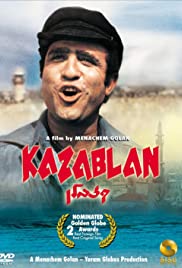
KAZABLAN
Israel, 1973, 114 minutes, Colour.
Yehoram Gaon, Arie Elias, Efrat Lavie, Yehudah Efroni, Joseph Graber.
Directed by Menahem Golan.
Kazablan is popular entertainment. An Israeli musical, it shows enormous dependence on American styles and techniques and plays up to the American musical expectations of the audience. West Side Story seems the main influence, plus Fiddler on the Roof and even American- Greek Never on Sunday. The monotonously gyrating choreography is poor. The characters, especially the villain, are over-drawn. On the credit side: good use of Jaffa locations, a very engaging hero, a pleasant heroine, and the perpetual love story. It is interesting to see a sample of Israel's film industry of the 70s and try to gauge something of the Israeli outlook of that period.
1. How successful was this as entertainment? How good a musical was it? How important for Israeli film-making?
2. How well did it use the ingredients of a musical - hero and heroine, the conflict, songs and dances, etc.? Was it too ordinary in its plot?
3. How much value did the music have? The quality of the songs, the Man of Respect etc., Kazablan's songs, the dance routines. (The monotony of the choreography?) The use of music and songs at the Israeli feasts? Did the film rely too much on American styles, e.g. West Side Story, Fiddler on the Roof? Why? Does such dependence matter?
4. How enjoyable would this film be for non-Jewish audiences? Why? Was the plot and its treatment universal enough for appeal? The picture of Jaffa, the city itself, old and new, rich and poor, like any other city? Did the film rely on Jewish religious outlooks or not?
5. How likeable - a hero was Kazablan himself? His personality? His singing? The explanation of his African origins? Suspicion by the police? (The later encounter with his friend?) His place with the gang, as a vagrant, his experience in the Six- Day War? A contemporary hero? His yearning and his bitterness? His life in Jaffa - acceptable to most people, in the night-life of Jaffa, the clubs, etc.? The transformation by the love for Rachel? His capacity for being hurt? By bitterness, wealth? How much a victim of society was he meant to be? His relationship with the police? His final vindication and happiness?
6. How well portrayed were the gang? Realistically? Their role in the plot? Their function as a chorus?
7. Did the fisherman telling the story add anything to the film? Giving it a 'folksy' atmosphere? The overtones of a fairy tale? The 'folksy' humour of the Jewish fisherman?
8. How attractive a heroine was Rachel? As seen within her conservative family? Her relationship to Yanosh? To her parents? Why was she attracted to Kazablan? Her skill in fending him off? The change in her?
9. Yanosh - was he caricatured as too evil a villain? The obvious clues and his stealing? Did he deserve his punishment?
10. How important was the framework of the town itself? The people in the town -their day to day life, their joys and fears, the attention to detail, the celebration at the circumcision? How important was this later for the community feeling of the film?
11. What did the realistic sets of Jaffa contribute to the film? Sense of atmosphere and authenticity?